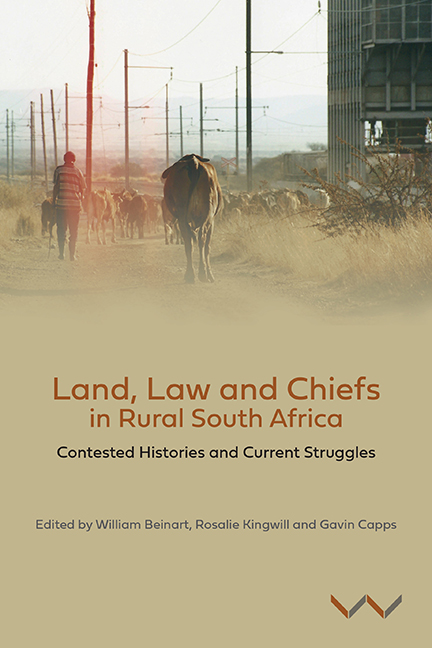Book contents
- Frontmatter
- Contents
- Maps
- Acronyms and Abbreviations
- Preface
- Introduction Land, Law and Chiefs: Contested Histories and Current Struggles
- Chapter 1 Constitutional Court Judgments, Customary Law and Democratisation in South Africa
- Chapter 2 Was ‘Living Customary Law’ There All Along?
- Chapter 3 When Custom Divides ‘Community’: Legal Battles over Platinum in North West Province
- Chapter 4 Chiefs, Mines and the State in the Platinum Belt: The Bapo-ba-Mogale Traditional Community and Lonmin
- Chapter 5 Mining, Graves and Dispossession in Mpumalanga
- Chapter 6 The Abuse of Interdicts by Traditional Leaders in South Africa
- Chapter 7 Resisting the Imposition of Ubukhosi: Contested Authority-Making in the Former Ciskei
- Chapter 8 Black Landlords, Their Tenants and the Native Administration Act of 1927
- Chapter 9 Customary Law and Landownership in the Eastern Cape
- Chapter 10 A History of Communal Property Associations in South Africa
- Chapter 11 ‘This is Business Land’: The Hlolweni Land Claim, 1983–2016
- Chapter 12 Restitution and Land Rights in the Eastern Cape: The Hlolweni, Mgungundlovu and Xolobeni Cases
- Contributors
- Index
Chapter 10 - A History of Communal Property Associations in South Africa
Published online by Cambridge University Press: 15 June 2021
- Frontmatter
- Contents
- Maps
- Acronyms and Abbreviations
- Preface
- Introduction Land, Law and Chiefs: Contested Histories and Current Struggles
- Chapter 1 Constitutional Court Judgments, Customary Law and Democratisation in South Africa
- Chapter 2 Was ‘Living Customary Law’ There All Along?
- Chapter 3 When Custom Divides ‘Community’: Legal Battles over Platinum in North West Province
- Chapter 4 Chiefs, Mines and the State in the Platinum Belt: The Bapo-ba-Mogale Traditional Community and Lonmin
- Chapter 5 Mining, Graves and Dispossession in Mpumalanga
- Chapter 6 The Abuse of Interdicts by Traditional Leaders in South Africa
- Chapter 7 Resisting the Imposition of Ubukhosi: Contested Authority-Making in the Former Ciskei
- Chapter 8 Black Landlords, Their Tenants and the Native Administration Act of 1927
- Chapter 9 Customary Law and Landownership in the Eastern Cape
- Chapter 10 A History of Communal Property Associations in South Africa
- Chapter 11 ‘This is Business Land’: The Hlolweni Land Claim, 1983–2016
- Chapter 12 Restitution and Land Rights in the Eastern Cape: The Hlolweni, Mgungundlovu and Xolobeni Cases
- Contributors
- Index
Summary
In 1996, two years after Nelson Mandela's African National Congress (ANC) government came to power in South Africa, workshops were being held all over the country to discuss how land reform could benefit groups who were dispossessed of their land rights under colonialism, segregation and apartheid. One of these workshops took place in the Dithakwaneng Community, near the town of Vryburg in the North West Province. The workshop was run by the Association for Community and Rural Advancement (AnCRA) with the assistance of several non-governmental organisations (NGOs) in the Surplus People Project (SPP) network, including the Transvaal Rural Action Committee (TRAC) and the Association for Rural Advancement (AFRA). During the 1980s, these organisations played a key role in helping people in rural areas defend themselves against the apartheid government's forced removals. After 1994, black South Africans who were dispossessed of land as a result of racial discrimination could lodge a claim through the Land Restitution Act. Participants at the Dithakwaneng workshop were the victims of forced removals. In 1996 they became land claimants who were workshopping new forms of property holding that would let them manage land as groups. In particular, they were debating collective land holding entities called communal property associations (CPAs).
At the Dithakwaneng workshop, a facilitator from AnCRA, Peter Mokomele, encouraged the participants to grapple with ideas about land law. He elaborated that they should think about ‘rules governing societies (unwritten codes and how we have come to follow them)’. Mokomele asked claimants to write down some rules they were aware of, and what happened if people violated these rules. The participants studied how the newly minted South African Constitution of 1996 was put together and discussed ‘how they [constitutions] hold us together in society’. The idea was to come up with a constitution for the CPA that would help bring the community of Dithakwaneng land claimants together. Disputes arose at the workshop between local organising committees (for land security, schools and water) and traditional leaders, whom many land claimants associated with the corrupt Bantustan government of Bophuthatswana. Mokomele asked participants to think about how to write a constitution that would promote democratic leadership in their community, while acknowledging the fissures.
- Type
- Chapter
- Information
- Land, Law and Chiefs in Rural South AfricaContested histories and current struggles, pp. 208 - 228Publisher: Wits University PressPrint publication year: 2021



